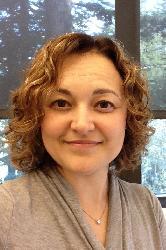IMS Affiliated Faculty

- Title
- Professor
- Division Physical & Biological Sciences Division
- Department
- Microbiology & Environmental Toxicology Department
- Phone 831-459-3049
- Fax 831-459-3524
- Website
- Office Location
- Biomedical Sciences, Biomed 244
- Mail Stop METX
- Mailing Address
- Mailstop: METX
- Faculty Areas of Expertise Microbiology, Immunology, Molecular Biology
- Courses METX 238: Pathogenesis: Molecular Mechanisms of Disease, METX 206A: Advanced Microbiology
Summary of Expertise
Bacterial pathogenesis.
Research Interests
The Auerbuch Stone lab elucidates how bacterial pathogens interact with the mammalian innate immune system, and uses this knowledge to discover novel antimicrobials. We focus our efforts on a specialized apparatus called the type III secretion system (T3SS), a needle-like bacterial appendage that injects effector proteins inside host cells to disarm immune defense mechanisms. The T3SS is a promising antimicrobial drug target; dozens of bacterial pathogens require a T3SS to infect a host, including the causative agents of pneumonia, plague, dysentery, and typhoid fever. The Auerbuch Stone lab approaches the study of the bacterial T3SS from three different angles:
• To understand how bacteria leverage their T3SS to cause disease, we use the model enteric pathogen Yersinia pseudotuberculosis to investigate how it senses host infection cues to regulate expression of the T3SS and associated virulence factors.
• The mammalian innate immune system has evolved to recognize and respond to the T3SS in order to fight infection. We are investigating how T3SS immune recognition affects the outcome of disease.
• To identify small molecule inhibitors of the T3SS, we focus our drug screening effort on Pseudomonas aeruginosa, which uses a T3SS to cause hospital-acquired pneumonia and other types of infections often associated with antibiotic resistance.
Biography, Education and Training
B.A. Cornell University
Ph.D. UC Berkeley
Postdoc Tufts University School of Medicine
Honors, Awards and Grants
National Academy of Sciences Kavli Fellow, 2014
UC Santa Cruz Hellman Fellow, 2011
